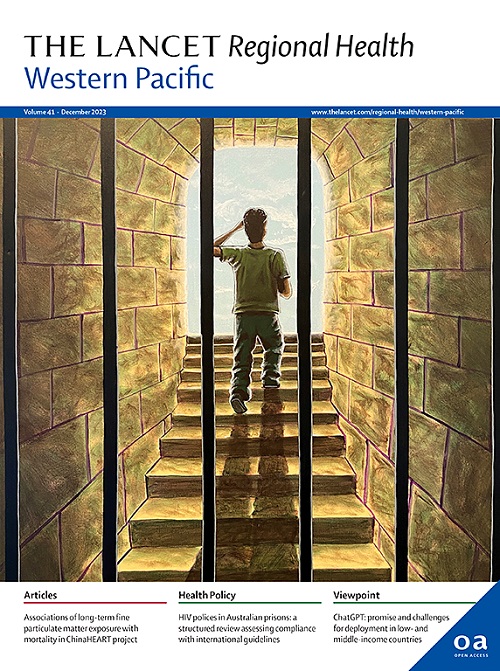在一项前瞻性队列研究中,胰岛素抵抗和抑郁症发生风险:年龄、血糖状态和肥胖的作用
IF 8.1
1区 医学
Q1 HEALTH CARE SCIENCES & SERVICES
引用次数: 0
摘要
尽管有新的证据,胰岛素抵抗和抑郁症之间的因果关系仍然存在争议。本研究旨在探讨胰岛素抵抗是否与抑郁症风险增加相关,以及这种关联是否受到潜在调节因子的影响。方法本多中心前瞻性队列研究分析了2011年至2022年参加江北三星健康研究的233,452名韩国成年人的健康筛查数据。在基线时,所有参与者都没有表现出严重的精神或神经障碍,也没有使用抗抑郁药或糖尿病药物。采用胰岛素抵抗稳态模型(HOMA-IR)评估胰岛素抵抗。事件性抑郁症定义为流行病学研究中心抑郁量表得分≥16分。随访时间为4.8±2.9年(年龄36.1±8.6岁,男性54.1%)。在1124268人年的随访期间,确诊了38801例偶发性抑郁症。多变量Cox比例风险分析显示,HOMA-IR水平与抑郁症发生率呈正剂量依赖关系(最高四分位数与最低四分位数的风险比[HR] = 1.15, 95%可信区间[CI] = 1.11-1.19)。这种关联在40岁以下的年轻人和血糖正常、超重、肌肉脂肪比低的个体中尤为明显。解释胰岛素抵抗可能是抑郁症的一个可改变的危险因素,强调早期筛查和管理胰岛素抵抗的重要性,以潜在地减轻抑郁症的负担,特别是在高危亚组中。本文章由计算机程序翻译,如有差异,请以英文原文为准。
Insulin resistance and the risk of incident depression: the role of age, glycemic status, and adiposity in a prospective cohort study
Background
Despite emerging evidence, the causal relationship between insulin resistance and depression remains controversial. This study aimed to investigate whether insulin resistance is associated with increased risk of incident depression and whether the association is affected by potential moderators.
Methods
This multi-centered prospective cohort study analyzed health screening data from 233,452 Korean adults participating in the Kangbuk Samsung Health Study from 2011 to 2022. At baseline, all participants indicated no major psychiatric or neurologic disorders and had not used antidepressant or diabetes medications. Insulin resistance was assessed using the homeostasis model assessment of insulin resistance (HOMA-IR). Incident depression was defined as having a Center for Epidemiologic Studies Depression Scale score of ≥16.
Findings
Participants (age = 36.1 ± 8.6 years, 54.1% male) were followed up for 4.8 ± 2.9 years. During the 1,124,268 person-years of follow-up duration, 38,801 cases of incident depression were identified. Multivariate Cox proportional hazards analysis revealed a positive dose-dependent association between HOMA-IR level and the risk of incident depression (hazard ratio [HR] for highest vs. lowest quartile = 1.15, 95% confidence interval [CI] = 1.11–1.19). This association was particularly strong in younger adults under 40 years and in individuals with euglycemia, overweight, and low muscle-to-fat ratio.
Interpretation
Insulin resistance may be a modifiable risk factor for depression, underscoring the importance of early screening and management of insulin resistance to potentially reduce the burden of depression, especially among at-risk subgroups.
Funding
None.
求助全文
通过发布文献求助,成功后即可免费获取论文全文。
去求助
来源期刊

The Lancet Regional Health: Western Pacific
Medicine-Pediatrics, Perinatology and Child Health
CiteScore
8.80
自引率
2.80%
发文量
305
审稿时长
11 weeks
期刊介绍:
The Lancet Regional Health – Western Pacific, a gold open access journal, is an integral part of The Lancet's global initiative advocating for healthcare quality and access worldwide. It aims to advance clinical practice and health policy in the Western Pacific region, contributing to enhanced health outcomes. The journal publishes high-quality original research shedding light on clinical practice and health policy in the region. It also includes reviews, commentaries, and opinion pieces covering diverse regional health topics, such as infectious diseases, non-communicable diseases, child and adolescent health, maternal and reproductive health, aging health, mental health, the health workforce and systems, and health policy.
 求助内容:
求助内容: 应助结果提醒方式:
应助结果提醒方式:


